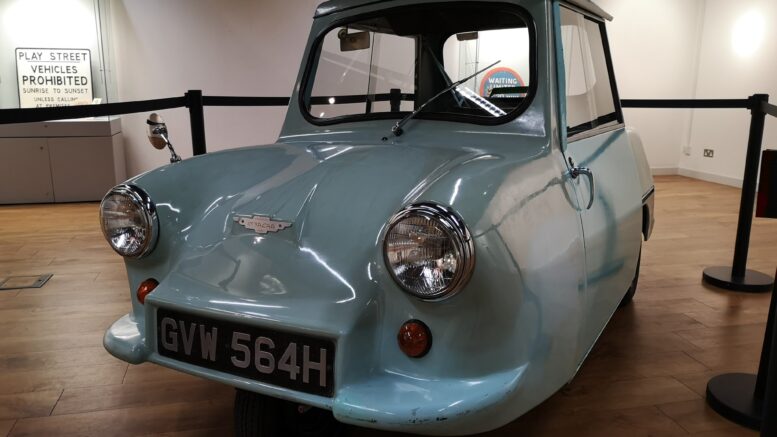A newly conserved Invacar has gone on display at Hull’s Streetlife Museum to celebrate UK Disability History Month.
The car will be displayed alongside a film from the East Midlands Film Archive from the 1970s, featuring people explaining how phasing out the Invacar would affect them. It is also accompanied by a personal story of owning an Invacar from Hull resident Mark Baggley.
The museum has also invited artist Jason Wilsher-Mills and local disability groups to respond to the display creatively, reflecting the freedom and independence the Invacar brought to some disabled people. Participants, including students from Frederick Holmes School, have been producing digital artwork which Jason will incorporate into large wall hangings that will be on display from mid-December. Jason’s artistic style is engaging, bright, colourful and almost psychedelic.
It was originally designed in 1946 with a lawnmower engine by engineer Bert Greeves for his cousin Derry Preston-Cobb, who was born paralysed from the waist down.
The Thundersley Invacar was a common sight in the 1960s and 70s, but has now completely disappeared from our streets. The Invacar was a three-wheeled motor vehicle issued to people with a physical disability by the Ministry of Health and Social Security from just after World War Two up until 1981. The initial reason for the eventual government scheme was to supply them at no cost to ex-servicemen through their war pensions.
The restoration and creative project have been funded by Arts Council England through National Portfolio Organisation support.
The exhibition information is available in Large Print, Audio, BSL interpretation and braille. The car is also being audio described.
Artist, Jason Wilsher Mills said: “My first memories of seeing Invacars was when I was watching Wakefield Trinity, with my dad as a young lad in the early 1970s. The little blue mobility cars were parked at the side of the pitch, as they were at all sporting events. I remember thinking just how cool they looked. Of course every child dreams of having their own personal vehicle, but when I became disabled later on, the idea of being independent was huge, and still is.
“I am so honoured to be part of this project, which will see me working with disabled communities in Hull, to commemorate just how important freedom and independence is to disabled people, whilst giving participants an opportunity to share their own stories. What will result from all of this is me creating new, bespoke artwork for the museum, made for, and with the disabled communities of Hull.”
Councillor Rob Pritchard, Hull Culture and Leisure Ltd (HCAL) Lead at Hull City Council said: “The Invacar was a vehicle that revolutionised life for disabled people in Britain. I’m glad we are able to bring one of the few examples left for people to enjoy and learn from this Disability History Month.”
The exhibition is free to attend and runs until Sunday 22 January 2023 at the Streetlife Museum.




